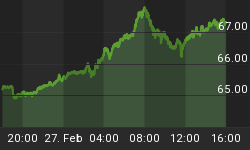It pains us to say, but interest rates likely aren't headed higher for quite a while. This is unfortunate, as they undoubtedly should. As we've written numerous times before, rising interest rates would spur economic growth, mostly by encouraging borrowing.
Right now people - potential homeowners, small business owners, etc. - have no reason to borrow today; they know that money will still be cheap tomorrow. Rising interest rates would give them an impetus to borrow NOW, because the cost of borrowing would be more expensive later.
But, as stated above, rates won't rise; not if Bernanke and the Federal Reserve have anything to say about. The reason why may surprise you: the Fed is trying to save its own skin.
Not many Americans realize that the Fed is not an agency of the federal government. To borrow a popular phrase, "the Federal Reserve is no more federal than Federal Express." But, on the other hand, the US central bank isn't exactly a private company either.
Technically, after the Federal Reserve Act, the Fed was organized by a group of large banks who owned the shares issued in their new venture. However, every year the Federal Reserve forwards any revenue left after paying its operating expenses to the US Treasury.
Normally this isn't such a bad gig for the Treasury (or the American taxpayer by extension). The Federal Reserve sets, manages, and executes US monetary policy, basically on a pro-bono basis. Granted, Americans may not always agree with the decisions made by the Fed or its chairman, but before the central bank came into being the United States averaged a major recession about every seven years. Since its creation, they've become significantly less frequent.
The structure of the Fed has also caused it problems, some of which are potentially severe and presently percolating just beneath the bank's limestone façade, ready to boil over.
For instance, due to the Fed's forwarding of all profits to the US Treasury each year, the Bank of Bernanke has no war chest to fall back on if it starts to lose money because it hasn't built up reserves over the years. If the Fed loses money, instead of dipping into savings it is forced to borrow from the Treasury to make up for its shortfalls. Obviously, this would not be a very popular move, politically speaking - especially given the current political climate.
The question at this point is why any of this is at all important. Rest assured - it is.
The US Federal Reserve holds a massive bond portfolio, comprised mostly of US Treasury debt. A good portion of this portfolio exists because during the financial calamity of 2008, tremendous amounts of debt were transferred from the private sector to the government. This is how the bailouts of big banks, insurance companies like AIG, and automakers were accomplished.
Bond-based investments by the Fed aren't exactly done by choice - it's not as though Ben Bernanke can order the Fed to reallocate a portion of its portfolio to Apple stock. No, the Fed owns bonds, currency swaps, and other instruments that allow it to help guide monetary policy.
The underlying problem here, though, is that if interest rates begin to rise, and especially if they do so quickly, the Federal Reserve will sustain large losses on its bond portfolio. Frequent readers will surely recall as a common subject in our columns the threat that bonds currently represent for investors, because as interest rise from the all-time lows where they are presently, the value of bonds outstanding will necessarily fall (this is one of the very few facts of finance that can be reduced to a formula, and is always true).
To bring this full circle, if interest rates begin to rise quickly and the values of bonds within the Fed's portfolio begin to fall, the Federal Reserve may sustain losses (as opposed to profits). Because the Fed has been sending its profits to the Treasury, it has no reserves to fall back on to make up any such losses. This, in turn, could leave the Federal Reserve technically insolvent and in need of a bridge loan from the US Treasury, which it would not likely receive in today's political environment.















